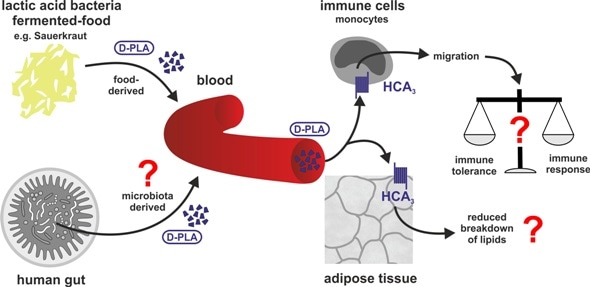Researchers have discovered that humans and great apes possess a receptor on their cells that detects metabolites from bacteria commonly found in fermented foods and triggers movement of immune cells. Claudia Stäubert of the University of Leipzig and colleagues report these findings in a new study published 23rd May in PLOS Genetics.

We found that D-phenyllactic acid is absorbed from lactic acid bacteria fermented food (e.g. Sauerkraut) and induces HCA3-dependent migration in human monocytes. Future studies need to address how HCA3 activation by lactic acid bacteria-derived metabolites modulates immune function and energy storage. Credit: Claudia Stäubert
Consuming lactic acid bacteria – the kind that turn milk into yogurt and cabbage into sauerkraut – can offer many health benefits, but scientists still don’t understand, on a molecular level, why it is helpful to ingest these bacteria and how that affects our immune system. Now, Stäubert and her colleagues have found one way that lactic acid bacteria interact with our bodies. Initially the researchers were investigating proteins on the surface of cells called hydroxycarboxylic acid (HCA) receptors. Most animals have only two types of this receptor but humans and great apes have three. The researchers discovered that a metabolite produced by lactic acid bacteria, D-phenyllactic acid, binds strongly to the third HCA receptor, signaling the immune system their presence. The researchers propose that the third HCA receptor arose in a common ancestor of humans and great apes, and enabled them to consume foods that are starting to decay, such as fruits picked up from the ground.
The study yields new insights into the evolutionary dynamics between microbes and their human hosts and opens new research directions for understanding the multiple positive effects of eating fermented foods.
We are convinced that this receptor very likely mediates some beneficial and anti-inflammatory effects of lactic acid bacteria in humans. That is why we believe it could serve as a potential drug target to treat inflammatory diseases.”
Author Claudia Stäubert, University of Leipzig
Future studies may reveal the details of how D-phenyllactic acid impacts the immune system, and whether the metabolite also affects fat cells, which also carry the third HCA receptor on their surfaces.
Source:
PLOS
Journal reference:
Peters, A. et al. (2019) Metabolites of lactic acid bacteria present in fermented foods are highly potent agonists of human hydroxycarboxylic acid receptor 3. PLOS Genetics. doi.org/10.1371/journal.pgen.1008145.